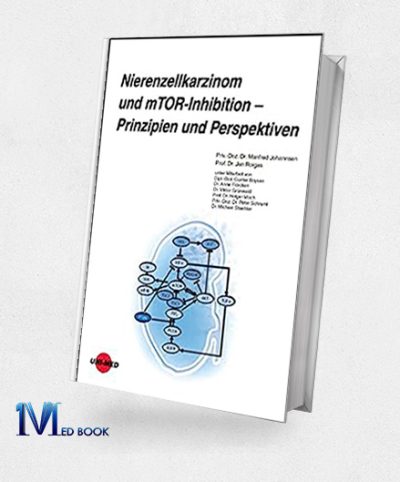Nephrology
Androgenblockade Beim Hormonabhängigen Prostatakarzinom (UNI-MED Science) (German Edition) (Original PDF From Publisher)
Original price was: $54.58.$27.00Current price is: $27.00.Bladder Pathology (Original PDF from Publisher)
Original price was: $174.00.$23.00Current price is: $23.00.Clinical Handbook of Nephrology (Original PDF from Publisher)
Original price was: $84.00.$40.00Current price is: $40.00.Clinical Handbook of Nephrology (True PDF)
Original price was: $103.99.$28.00Current price is: $28.00.Diagnostic Atlas of Renal Pathology Expert Consult Online and Print 2nd Edition (Original PDF from Publisher)
Original price was: $193.17.$30.60Current price is: $30.60.High Yield Neuroanatomy 5th Edition
Original price was: $35.00.$23.00Current price is: $23.00.Nierenzellkarzinom Und MTOR-Inhibition – Prinzipien Und Perspektiven (UNI-MED Science) (German Edition) (Original PDF From Publisher)
Original price was: $25.74.$21.00Current price is: $21.00.Practical Renal Pathology A Diagnostic Approach A Volume in the Pattern Recognition Series (Original PDF from Publisher)
Original price was: $229.41.$32.60Current price is: $32.60.Renal Pathophysiology The Essentials 4th Edition (Original PDF from Publisher)
Original price was: $47.43.$21.00Current price is: $21.00.Renal Physiology A Clinical Approach (Integrated Physiology Series)
Original price was: $40.27.$21.90Current price is: $21.90.Vanders Renal Physiology 8th Edition (Lange Medical Books)
Original price was: $37.63.$23.00Current price is: $23.00.Nephrology
Introduction to Nephrology: Guardians of Kidney Health
Nephrology, the specialized branch of medicine dedicated to the study and treatment of kidneys, emerges as a sentinel in the vast landscape of healthcare. Within the intricate web of physiological intricacies, the kidneys play a pivotal role in maintaining overall well-being. Nephrologists, positioned as custodians of renal health, navigate the labyrinthine pathways of kidney function. Their mission extends beyond the management of disorders; they stand as guardians, devoted to preserving the delicate balance essential for the body’s harmonious functioning.
Significance of Nephrology: Beyond Filtration and Secretion
The significance of nephrology transcends the mere anatomical consideration of the kidneys. These bean-shaped organs, nestled in the retroperitoneal space, are not mere filters but conductors of a symphony of physiological processes. Nephrology delves deep into the intricate dance of renal anatomy and physiology, emphasizing the multifaceted roles of filtration, reabsorption, and secretion. These processes form the bedrock of a delicate equilibrium, orchestrating the systemic homeostasis that underpins the well-being of the entire organism.
The kidneys, often underestimated in their complexity, go beyond the elimination of waste. They are architects of fluid and electrolyte balance, regulating blood pressure, and influencing red blood cell production. In the hands of nephrologists, the kidneys are not passive entities; they are dynamic partners in the continuous ballet of life-sustaining processes.
Understanding Renal Anatomy and Physiology: A Symphony of Functions
To comprehend the significance of nephrology, one must embark on a journey into the intricacies of renal anatomy and physiology. The kidneys, with their complex architecture, are composed of a network of nephrons—the functional units responsible for the filtration of blood and the subsequent formation of urine.
Filtration, the initial act in this physiological drama, occurs in the glomerulus, a specialized tuft of capillaries within each nephron. Here, blood is sieved, allowing water, electrolytes, and waste products to pass into the renal tubules. The orchestration continues with reabsorption, where essential substances are reabsorbed into the bloodstream, ensuring their retention. Simultaneously, secretion involves the active transport of additional substances into the urine for elimination. This intricate interplay of filtration, reabsorption, and secretion culminates in the formation of urine—a process that goes beyond waste removal, serving as a regulator of the body’s internal milieu.
The nephron, akin to a miniature symphony conductor, fine-tunes the composition of bodily fluids, maintaining a delicate balance crucial for health. Nephrologists, armed with an in-depth understanding of this symphony, decipher the nuances of renal function to diagnose, manage, and intervene when the harmonious balance is disrupted.
Common Kidney Disorders: The Dissonance in Harmony
In the realm of nephrology, the symphony sometimes encounters dissonance—common kidney disorders that disrupt the delicate balance. Chronic Kidney Disease (CKD), akin to a persistent discord, underscores the chronic nature of renal ailments. Kidney stones, crystalline formations within the urinary tract, introduce irregular notes, and glomerulonephritis, an inflammation affecting the kidney’s filtering units, creates turbulence in the once harmonious melody. Nephrology, as the conductor of this physiological symphony, strives not only to diagnose and manage these disorders but also to restore the symphonic equilibrium.
Diagnostic Methods in Nephrology: Illuminating the Symphony’s Score
In the hands of nephrologists, diagnostic methods serve as illuminating tools, revealing the intricacies of the symphony’s score. Routine laboratory tests dissect blood and urine, unraveling subtle deviations that may hint at underlying renal issues. Imaging studies, akin to a visual representation of the composition, capture the nuanced details of renal structure. Renal biopsies, a microscopic exploration, offer a closer look at the cellular narrative, aiding in the precise diagnosis and assessment of renal disorders.
These diagnostic methodologies, wielded with precision, allow nephrologists to navigate the intricate symphony of renal health. They become interpreters, decoding the subtle nuances that hint at potential disruptions and guiding interventions to restore harmony.
Renal Replacement Therapies: Restoring the Symphony’s Crescendo
In the crescendo of advanced kidney disease, nephrology introduces life-sustaining therapies—renal replacement therapies. Hemodialysis, an external blood filtration process, and peritoneal dialysis, utilizing the peritoneal membrane for waste removal, serve as the instrumental solos, compensating for compromised renal function. Kidney transplantation, the magnum opus of interventions, stands as a testament to medical ingenuity and the relentless pursuit of restoring the symphony’s crescendo.
Nephrology, through these therapeutic modalities, addresses the challenges of advanced kidney disease. The goal is not merely to prolong life but to enhance both its quantity and quality. The symphony, though altered, continues, and nephrologists strive to ensure that each note, each instrument in the composition, resonates with vitality.
Hypertension and Nephrology: Orchestrating Blood Pressure Harmony
In the symphony of nephrology, the relationship with hypertension is a delicate duet. Elevated blood pressure, a potential disruptor of the renal symphony, poses a significant threat to kidney health. Nephrologists, attuned to the nuances of this interplay, assume a pivotal role in managing hypertensive kidney disease. Through vigilant monitoring and strategic control of blood pressure, they become conductors, orchestrating a harmonious balance to prevent the gradual erosion of the symphony’s beauty.
The collaboration between nephrology and hypertension management goes beyond treating elevated blood pressure. It involves a deeper understanding of the intricacies of renal perfusion and filtration pressure. Nephrologists become architects of blood pressure control, striving to prevent the silent erosion of kidney function and preserve the symphony’s resonance.
Pediatric Nephrology: Cultivating Melodies in the Young
In the realm of pediatric nephrology, the symphony takes on a unique melody. The challenges presented by kidney issues in children demand a specialized approach. Congenital anomalies and pediatric glomerular diseases, distinct from their adult counterparts, introduce a youthful cadence to the symphony.
Pediatric nephrologists, akin to skilled composers, craft melodies that resonate with the delicate physiology of the young. They not only provide medical expertise but also lend a compassionate touch, recognizing the need for a nuanced balance in caring for the pediatric population. The symphony, in the hands of pediatric nephrologists, evolves with a sensitivity that acknowledges the unique needs of growing bodies.
Nutrition and Nephrology: Harmonizing Dietary Choices
The symphony of nephrology extends its influence to the dining table, where nutrition plays a pivotal role. Nephrology recognizes the impact of dietary choices on renal function, shaping personalized dietary plans that harmonize with the specific needs of individuals with kidney disorders. This dietary composition becomes a key element in orchestrating the symphony of renal health.
The nutritional score, composed under the guidance of nephrologists, addresses not only the immediate needs of managing existing conditions but also the long-term goal of promoting kidney health. Dietary considerations become integral to the overall symphony, ensuring that each meal resonates with the well-being of the kidneys.
Renal Immunology and Inflammatory Conditions: Addressing the Discordant Notes
In the intricate symphony of nephrology, the presence of renal immunology and inflammatory conditions introduces discordant notes. Immune-mediated kidney diseases, exemplified by lupus nephritis, underscore the intricate interplay between the immune system and renal health. Nephrology, the conductor in this scenario, navigates through the dissonance, employing diagnostic approaches and immunomodulatory treatments to address the unique challenges posed by inflammatory conditions.
This aspect of nephrology involves a careful orchestration of treatment modalities, aiming not only to alleviate symptoms but also to restore the harmonious balance disrupted by inflammation. Nephrologists, armed with knowledge and innovation, strive to compose a melody that transcends the discord, paving the way for a comprehensive and tailored response.
Geriatric Nephrology: Sustaining Melodies in the Golden Years
In the golden years of life, the symphony of nephrology assumes a different timbre. Geriatric nephrology recognizes the unique challenges presented by age-related changes in renal function. The collaborative approach of nephrologists involves not only managing kidney health but also addressing the complexities arising from comorbidities and polypharmacy in older adults.
Geriatric nephrology embodies a holistic paradigm, considering not just the kidneys but the entirety of the individual’s well-being. Nephrologists become composers of care plans that resonate with the nuances of aging, ensuring that the symphony of renal health plays on in the golden years with a grace that reflects a life well-lived.
Genetic Kidney Disorders: Decoding the Symphony’s Blueprint
In the intricate symphony of nephrology, genetic kidney disorders form a unique movement. These often inherited conditions add a layer of complexity, requiring nephrologists to delve into the genetic blueprint. Advanced genetic testing becomes the conductor’s baton, guiding precise diagnoses and offering insights into the orchestration of genetic kidney diseases.
Ongoing research efforts in genetic nephrology aim to unravel the intricacies of these complex conditions. The symphony, in this context, becomes a canvas for exploration, where each note, each gene, contributes to the unfolding narrative. Nephrologists, engaged in this research, aspire not only to understand but also to compose innovative management strategies that resonate with the intricacies of genetic kidney disorders.
Anatomy and Physiology of the Kidneys: Maestros of Balance
In the exploration of nephrology, the anatomy and physiology of the kidneys emerge as a captivating narrative. The kidneys, with their intricate tubular networks and specialized nephrons, tirelessly execute the task of filtration, ensuring the removal of waste products while retaining essential substances. The orchestration of reabsorption and secretion within these nephrons contributes to the meticulous regulation of electrolytes, acid-base balance, and blood pressure—an exquisite dance that sustains life.
Common Kidney Disorders: Navigating the Labyrinth of Diseases
As guardians of kidney health, nephrologists confront a myriad of challenges presented by common kidney disorders. Chronic Kidney Disease (CKD), a pervasive condition, underscores the chronic nature of renal ailments. Kidney stones, crystalline formations within the urinary tract, and glomerulonephritis, an inflammation affecting the kidney’s filtering units, represent additional complexities. Nephrology not only unravels the causes and symptoms of these disorders but also pioneers current diagnostic and management approaches, standing as a bulwark against the insidious progression of renal diseases.
Diagnostic Methods in Nephrology: Illuminating the Inner Workings
The diagnostic prowess of nephrology shines through a sophisticated array of methods. From routine laboratory tests that unveil the subtlest deviations in blood and urine parameters to imaging studies that capture the intricate details of renal structure, these tools provide insights into the health and functionality of the kidneys. Renal biopsies, a meticulous procedure, offer a microscopic view of kidney tissue, aiding in the precise diagnosis and assessment of renal disorders. Nephrology, thus armed, navigates the diagnostic landscape with precision and nuance.
Renal Replacement Therapies: Pioneering Solutions for Advanced Disease
In the realm of advanced kidney disease, nephrology introduces life-sustaining therapies known as renal replacement therapies. Hemodialysis, a process of external blood filtration, and peritoneal dialysis, utilizing the peritoneal membrane for waste removal, serve as lifelines for individuals with compromised renal function. Kidney transplantation, an intricate surgical endeavor, stands as a beacon of hope, offering a renewed lease on life. Nephrology, through these therapies, addresses the challenges of advanced kidney disease, striving to enhance both the quantity and quality of life for those navigating this intricate terrain.
Hypertension and Nephrology: Guardians Against the Silent Threat
The symbiotic relationship between hypertension and nephrology forms a critical juncture in the specialty’s landscape. Hypertension, often a silent threat, exerts a profound impact on kidney health. Nephrologists, equipped with a nuanced understanding of this interplay, assume a pivotal role in managing hypertensive kidney disease. Through vigilant monitoring and strategic blood pressure control, nephrology becomes a frontline defender against the insidious progression of kidney damage induced by elevated blood pressure.
Pediatric Nephrology: Nurturing Renal Health from the Start
The specialized domain of pediatric nephrology focuses on the unique challenges presented by kidney issues in children. Congenital anomalies and pediatric glomerular diseases, distinct from adult counterparts, demand a specialized approach. Pediatric nephrologists, adept in addressing the intricacies of renal issues in the young, provide not only medical expertise but also a compassionate touch, recognizing the delicate balance needed in caring for the pediatric population.
Nutrition and Nephrology: Fueling Kidney Health
In the synergy between nutrition and nephrology, dietary considerations emerge as crucial facets of renal care. Nephrology recognizes the impact of nutritional choices on renal function, offering personalized dietary plans that align with the specific needs of individuals with kidney disorders. Through this tailored approach, nephrology not only manages existing conditions but also plays a proactive role in promoting kidney health through optimal nutrition.
Renal Immunology and Inflammatory Conditions: Unraveling Complexities
Renal immunology and inflammatory conditions add layers of complexity to the tapestry of nephrology. Immune-mediated kidney diseases, exemplified by lupus nephritis, highlight the intricate interplay between the immune system and renal health. Nephrology navigates this terrain with a keen eye, employing diagnostic approaches and immunomodulatory treatments to address the unique challenges posed by inflammatory conditions, ensuring a comprehensive and tailored response.
Geriatric Nephrology: Meeting the Challenges of Aging Kidneys
In the aging population, nephrology takes on the mantle of geriatric care, recognizing the unique challenges posed by age-related changes in renal function. The collaborative approach of nephrologists involves not only managing kidney health but also addressing the complexities arising from comorbidities and polypharmacy in older adults. Geriatric nephrology embodies a holistic paradigm, considering not just the kidneys but the entirety of the individual’s well-being.
Genetic Kidney Disorders: Decoding the Symphony’s Genetic Blueprint
In the intricate symphony of nephrology, a distinct and complex movement is dedicated to genetic kidney disorders—conditions that often unfold from the intricate folds of our genetic blueprint. Nephrologists, armed with expertise and cutting-edge technologies, embark on a journey into the intricacies of the genetic landscape, utilizing advanced genetic testing as a powerful tool for precise diagnosis. Ongoing research endeavors in this realm not only aim to unravel the intricacies of genetic kidney diseases but also strive to illuminate the path toward innovative management strategies and a deeper understanding of these often perplexing conditions.
Unraveling the Genetic Tapestry: A Symphony in DNA
Genetic kidney disorders, standing as sentinels within the vast expanse of nephrology, are characterized by anomalies in the DNA blueprint that governs the development and function of the kidneys. These conditions often manifest across generations, weaving a tapestry of genetic intricacies that nephrologists are tasked with deciphering. As guardians of renal health, nephrologists delve into this genetic symphony, utilizing advanced genetic testing techniques to identify the precise variations and mutations that underlie these conditions.
The symphony of genetic nephrology involves not only identifying the genetic notes but understanding the complex interplay between various genetic factors. Genetic testing, once a nascent tool, has evolved into a sophisticated instrument capable of unraveling the genetic nuances that contribute to the symphony of kidney function. From single-gene disorders to complex polygenic conditions, nephrologists meticulously decode the symphony embedded within the DNA strands, striving for a comprehensive understanding that guides precise diagnosis and treatment.
Advanced Genetic Testing: A Conductor’s Baton in Precision Medicine
In the contemporary landscape of nephrology, advanced genetic testing emerges as a conductor’s baton, guiding the symphony of precision medicine. Molecular techniques, including next-generation sequencing, enable nephrologists to explore the genetic landscape with unprecedented detail. These tools allow for the identification of specific genetic variations, shedding light on the underlying causes of genetic kidney disorders.
As nephrologists decode the genetic language, they unveil not just the predispositions and risks but also the potential trajectories of these disorders. The symphony of genetic testing, conducted with precision and nuance, contributes not only to accurate diagnosis but also to the tailoring of therapeutic interventions. Precision medicine, guided by the insights gleaned from genetic testing, stands as a testament to the evolving nature of nephrology—a field where each patient’s genetic symphony becomes the guide for personalized care.
Ongoing Research: Composing the Future of Genetic Nephrology
The symphony of genetic nephrology is far from static; it is a living composition that evolves with each research endeavor. Ongoing studies in the field of genetic kidney disorders aim to decipher the remaining mysteries, filling gaps in our understanding and refining the orchestration of care. Researchers and nephrologists collaborate to elucidate the intricate pathways, interactions, and regulatory mechanisms embedded within the genetic code.
In laboratories and clinical settings alike, the symphony continues to expand as researchers explore the potential of gene therapies, CRISPR technologies, and other innovative interventions. The goal is not only to understand genetic kidney disorders at a fundamental level but also to manipulate the genetic symphony to orchestrate a harmonious response—paving the way for groundbreaking treatments and, perhaps, cures.
Conclusion:
A Better Understanding for a Brighter Future: Nephrology’s Ever-Advancing Sonata
In conclusion, the realm of genetic kidney disorders epitomizes the ever-advancing sonata that is nephrology. As nephrologists decode the genetic blueprint, utilizing advanced testing methodologies, they contribute to a growing body of knowledge that transcends the limitations of the past. The symphony of genetic nephrology, marked by precision and innovation, holds the promise of transformative advancements in the understanding and management of these intricate conditions.
Nephrology, far from being a static specialty, stands as a dynamic force, intricately woven into the fabric of healthcare. Its critical role in maintaining kidney health and overall well-being is amplified by the strides taken in genetic nephrology. As the symphony of nephrology expands, it stands as a testament to the relentless pursuit of excellence—a commitment to unraveling the complexities of renal health and providing optimal care to those under its guardianship.
The genetic symphony, with its intricate notes and harmonious chords, is a beacon guiding nephrology into a future where the mysteries of genetic kidney disorders are unraveled, and each patient’s unique genetic composition becomes the foundation for personalized and effective care. The ever-advancing horizon of nephrology, propelled by ongoing research and the precision of genetic insights, holds the promise of a brighter future for individuals managing genetic kidney disorders—a future where the symphony of renal health resonates with vitality and well-being.












